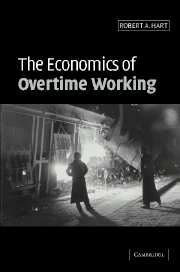Book contents
- Frontmatter
- Contents
- List of figures
- List of tables
- Preface
- 1 Overview
- 2 Facts and figures
- 3 The overtime decision
- 4 The overtime premium
- 5 Overtime hours and empirical studies
- 6 Overtime pay and empirical studies
- 7 Policy issues
- 8 Is overtime working here to stay?
- References
- Index of names
- Index of subjects
6 - Overtime pay and empirical studies
Published online by Cambridge University Press: 22 September 2009
- Frontmatter
- Contents
- List of figures
- List of tables
- Preface
- 1 Overview
- 2 Facts and figures
- 3 The overtime decision
- 4 The overtime premium
- 5 Overtime hours and empirical studies
- 6 Overtime pay and empirical studies
- 7 Policy issues
- 8 Is overtime working here to stay?
- References
- Index of names
- Index of subjects
Summary
Interest in the pay aspect of overtime working stems largely from the fact that hourly wage rates that attach to overtime hours typically differ from standard rates. Most of the overtime wage literature has concerned itself with overtime rates that, due to a payment of an overtime premium, are in excess of standard rates. We have seen, however, that some workers receive lower-than-standard rates for overtime work while others claim to work overtime hours at a zero rate.
Three variables determine the relative importance of overtime pay within the firm's total payroll. The first is the average number of overtime hours employed by the firm. The second is the size of the hourly premium – or premia if the premium varies with the length of weekly hours – relative to the standard hourly wage rate. The third is the proportion of the firm's employees who are classified as overtime workers. The topic of wage earnings decomposition is clearly central to issues of overtime pay (see section 2.6) and we return briefly to it in section 6.1. This section also contains a discussion on the difficulties over interpreting the roles of wage rates and wage earnings in time-series analysis.
An unanticipated increase in the firm's product demand might be expected to impact positively on one or more of these three variables.
- Type
- Chapter
- Information
- The Economics of Overtime Working , pp. 117 - 133Publisher: Cambridge University PressPrint publication year: 2004



